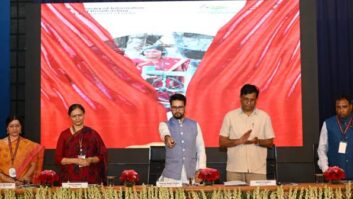
Alexander Vojvoda, a civil peace service worker
for the Presbyterian Church, works at
CBS Radio FM 95.3 in Southwest Cameroon.
Alexander Vojvoda, a civil peace service worker for the Presbyterian Church in Buea, Cameroon, works at CBS Radio FM 95.3 as part of his mission. He has developed media training tools for radio and engaged in capacity-building for editorial staff, volunteer and marginalized groups. In a conversation with Dr. Kanchan K. Malik, associate professor, Department of Communication, University of Hyderabad, India, during the AMARC 11 conference, which took place in Accra, Ghana, Vojvoda discusses the status of community radio in Cameroon and his perception of the role community radio can play in building peace.
Kanchan K. Malik: What is the status of community radio in Cameroon?
Alexander Vojvoda: In Cameroon we have approximately 100 “community” radio stations. Although, if we follow the definition of community radio as those that are owned and run by the community, then there actually are far fewer. One of the reasons for this is that external donors often bring technology and funds to the country in order to set up the radio stations, but do not follow up on the community development aspects. There are therefore many “ghost” stations that are run by just one person and do not have any community participation. Fortunately, though, there are also people, churches and groups who set up their own infrastructures in a rural areas to serve certain communities.
KKM: Cameroon has public, commercial, and not-for-profit community radio stations, is there a policy in place that makes provisions for all this? A media policy or a broadcasting policy?
Vojvoda: Yes, but the problem is that this policy is not executed, which means that one applies for a license on a community-level and pays the license fee but never receives a decree. Thus stations here operate without licenses. They have proof that they are in the process of being issued a license, so they can set up the station. But since the procedure is not finalized, they risk being shut down at any time.
KKM: What purpose does community radio serve in Cameroon?
Vojvoda: When we talk about community radio in Cameroon, we talk about infrastructure for information, education and entertainment. The villages are cut off from electricity and water, sometimes for days, months. There are no regular newspapers or Internet. Community radio stations in these areas provide the only source of information people have about their culture, language, political, health, social and economic situation. Community radio can deal with local issues and problems, and also offer a platform for dialog.
However, there are also cases where people say they run community stations, but they are actually operating a commercial one. Some of them practice “combo-journalism,” which is a sort of paid news. There is no minimum wage for journalists here, no code of conduct, no regulation or unions; so these people need to find ways to make their ends meet. There is this duality in the sector.
People sometimes start a community radio with a community structure behind it, but have no sustainable mechanism. And when external donors withdraw, community involvement disappears and then they shift to commercial. It’s a phenomenon that has been increasingly appearing in the last few years.
KKM: You work for a community radio station and also facilitate the community radio sector within the country. What does your work entail? And what is your mission?
Vojvoda: I work at CBS Radio FM 95.3 in Southwest Cameroon. The Presbyterian Church owns the radio [license]. My role is aimed at building a stronger community commitment, bring in civil societies and NGOs, and also critical groups that are deliberately excluded.
Cameroon is still regarded as a “nonviolent” country but it has many hidden issues. Our station’s role is not post-conflict, it’s more about conflict prevention and encouraging communication.
In the north we have an influx of Boko Haram, which is becoming intensified. In the south, there are many refugees from Central African Republic and Democratic Republic of Congo and that sometimes creates tensions with the local population. In the southwest region, we still have the issues with Nigeria and the Bakassi Peninsula regarding oil. The situation here is incendiary. There are a lot of problems that need to be addressed and community radio can play a key part by offering a platform for dialog and understanding.
Other concerns include generational strife, hierarchical, patriarchal structures that are in place and violence against women. There are a lot of conflict lines and fragmentation within the society. Questions like how to involve the youth within the democratic process and unemployment are also important. These matters in the context of community radio are the focus of my work in Cameroon.
Radio boosts awareness and provides information, teaches people how to participate and integrate into society and raises the voices of those who normally aren’t heard. This all aids in democratic advancement.
KKM: How many of the women, actually, get mobilized to participate?
Vojvoda: Staff-wise we have a high percentage of women. Many of them are technicians and journalists. But the problem at the foundation is about who is making the decisions. The positions for the decision-making roles are clearly male-dominated. So the women are doing most of the work but the decision-making and prestigious representative positions are held by men.
There are therefore huge strides to be made, but we hope that as a first step, we are able to advocate and raise awareness about community radio’s potential as a foundation for building peace.
Note: RadioWorld thanks Ram Awtar Yadav for his help with transcribing the interview.










